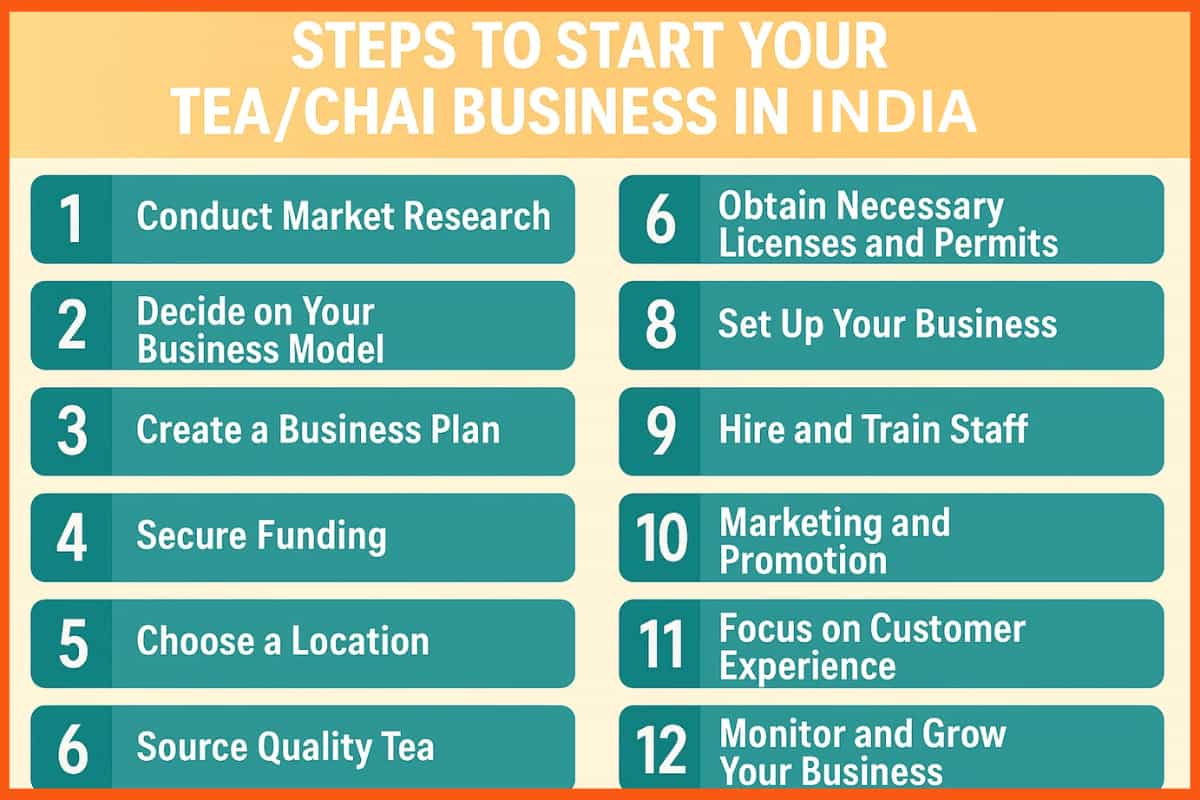Tea Shop Business Plan: How to Start a Successful Tea Business in India
📖 Learning
India is a country where tea, or chai as it's popularly known, is more than just a beverage—it's a daily ritual and an integral part of life. With a rich tea culture and a massive market, starting a tea/chai business in India can be a lucrative venture. Whether you want to open a quaint tea shop, launch a chai cart, or sell packaged tea, this guide will help you navigate the steps necessary to start your tea/chai business in India.
Why Start a Tea/Chai Business in India?
Before diving into the nitty-gritty details, let's understand why starting a tea business in India is a promising idea:
- Huge Market Demand: India is the second-largest consumer of tea in the world. Almost every household starts their day with a cup of chai. The tea business in India is growing fast. It is expected to grow by 6.5% every year from 2021 to 2026.
- Cultural Significance: Tea is deeply rooted in Indian culture, making it a product with a constant demand.
- Versatility: You can offer a wide variety of teas—masala chai, green tea, black tea, herbal tea, and more.
- Low Startup Costs: Starting a tea business typically requires a lower initial investment compared to other businesses.
- Profit Margins: Tea leaves have a long shelf life, and the profit margins can be substantial, especially if you source your tea directly from plantations. India’s tea market was worth USD 11,702.3 million in 2024 and may grow to USD 17,934.1 million by 2033, growing at 4.19% every year.

Steps to Start Your Tea/Chai Business in India

1. Conduct Market Research
Before you start, it's crucial to understand the market. Conduct thorough research to identify your target audience, their preferences, and the competition. Here are some aspects to focus on:
- Consumer Preferences: Identify what types of tea are popular in your target area.
- Competitor Analysis: Study your competitors to understand their strengths and weaknesses.
- Price Analysis: Determine the price range of different types of tea in the market.
2. Decide on Your Business Model
There are several ways to enter the tea business in India. Choose a business model that aligns with your goals and budget:
- Tea Shop/Cafe: A physical location where customers can come and enjoy a cup of tea.
- Chai Cart: A mobile tea stall that can be set up in busy areas.
- Online Tea Store: Selling packaged tea through an online platform.
- Wholesale Tea Supply: Supplying tea to restaurants, cafes, and other businesses.
| Famous Chai Franchise in India | Franchise Outlets | Infrastructure Investment | Website |
|---|---|---|---|
| Chai Sutta Bar | 550+ | INR 16–18 Lakh | chaisuttabarindia.com |
| Chai Garam | 300 | INR 15–20 Lakh | chaigaramcafe.com |
| Chaayos | 200 | INR 5–10 Lakh | chaayos.com |
| Chai Point | 170 | INR 25–30 Lakh | shop.chaipoint.com |
| Chai Calling | 110+ | INR 4–5 Lakh | chaicalling.com |
| MBA CHAI WALA | 100 | INR 2–5 Lakh | mbachaiwala.com |
| Chaai Seth | 50 | INR 4–6 Lakh | chaaiseth.com |
| Chai Thela | 40 | INR 4–5 Lakh | chaithela.com |
| Tea Trails | 40+ | INR 35–40 Lakh | Not Available |
| Chai Nagri | 20 | INR 10–15 Lakh | chainagri.in |
| Tea Villa Café | 10 | INR 5–10 Lakh | teavilla.in |
| The Tea Planet | 9 | INR 15–20 Lakh | theteaplanet.com |
| Pappu Chaiwalla | NA | INR 15–18 Lakh | pappuchaiwalla.com |
| Chahapani Amruttulya | 100–200 | INR 5–10 Lakh | chahapani.com |
3. Create a Business Plan
A well-structured business plan is essential for any startup. It will serve as a roadmap for your business and help you secure funding if needed. Your business plan should include:
- Executive Summary: A brief overview of your business.
- Market Analysis: Detailed research on the market and competition.
- Business Model: Description of your business model and revenue streams.
- Marketing Strategy: How you plan to attract and retain customers.
- Financial Plan: Budget, pricing strategy, and projected revenue.

4. Secure Funding
Depending on your business model, you may need to secure funding to cover initial costs such as inventory, equipment, rent, and marketing. Here are some options to consider:
- Personal Savings: Using your own savings to fund the business.
- Bank Loans: Applying for a business loan from a bank.
- Investors: Seeking investment from venture capitalists or angel investors.
- Crowdfunding: Raising funds through crowdfunding platforms.
5. Choose a Location
If you're opening a physical tea shop or chai cart, location is key. Look for areas with high foot traffic, such as markets, office complexes, and educational institutions. The right location can significantly impact your business's success.
6. Choose a Location
The quality of your tea will determine the success of your business. Partner with reputable tea plantations or suppliers to ensure you get the best quality tea leaves. Consider visiting tea plantations in Assam, Darjeeling, and Nilgiri to source your tea directly.
The tea market is vast, and choosing a niche can help you stand out. Some popular types of tea include:
- Organic Tea: Offering tea that is free from chemicals and pesticides.
- Flavored Tea: Providing a variety of flavors like masala chai, lemon tea, and ginger tea.
- Health-focused Tea: Health-focused teas are quite popular now. Selling teas with health benefits like green tea, chamomile tea, and detox teas is a great option.
- Luxury Tea: Targeting the premium market with high-quality, exotic teas.

7. Obtain Necessary Licenses and Permits
Before you start selling tea, you need to obtain the necessary licenses and permits. Here are some common ones:
- FSSAI License: Food Safety and Standards Authority of India license is mandatory for any food-related business.
- Shop and Establishment Act License: Required if you have a physical shop.
- GST Registration: For tax purposes.
- Local Municipal Permits: Depending on your location, you may need additional permits from local authorities.
8. Set Up Your Business
Once you have all the necessary permits, it's time to set up your business:
- Tea Shop/Cafe: Furnish your shop with comfortable seating, a counter, and tea-making equipment.
- Chai Cart: Equip your cart with a stove, tea kettles, and other essentials.
- Online Store: Create a user-friendly website and set up an e-commerce platform.
9. Hire and Train Staff
If you're running a tea shop or chai cart, you'll need to hire staff to help you with daily operations. Train your staff to prepare tea correctly, maintain hygiene, and provide excellent customer service.
10. Marketing and Promotion
Branding and Packaging
Branding is essential to create a unique identity for your business. Invest in professional branding and attractive packaging. Your packaging should reflect the quality and essence of your tea. It should also be eco-friendly, as consumers are becoming more environmentally conscious.
To attract customers, you need a solid marketing strategy. Here are some effective marketing techniques:
- Social Media: Use platforms like Instagram, Facebook, and Twitter to create awareness and engage with customers.
- Local Advertising: Distribute flyers, put up banners, and advertise in local newspapers.
- Promotions and Discounts: Offer introductory discounts to attract initial customers.
- Loyalty Programs: Implement a loyalty program to encourage repeat business.
11. Focus on Customer Experience
Customer satisfaction is crucial for the success of your tea business. Ensure that your tea is of high quality, your service is prompt, and your environment is welcoming. Encourage customer feedback and make improvements based on their suggestions.
12. Monitor and Grow Your Business
Once your business is up and running, continually monitor its performance. Track sales, expenses, and customer feedback. Use this data to make informed decisions and grow your business. Explore opportunities to expand, such as opening new locations or diversifying your product offerings.

Conclusion
Starting a tea/chai business in India requires careful planning and execution. By conducting thorough market research, choosing the right niche, and focusing on quality and customer service, you can build a successful tea brand. Remember, tea is more than just a beverage; it's an experience. Create a memorable experience for your customers, and your business will thrive.
FAQs
What is Chai business profit margin?
A tea business can be quite profitable, offering profit margins that usually range between 50% and 70%.
How much a tea vendor earn in India?
A busy tea shop selling around 1,200 cups of tea or coffee daily can earn approximately INR 7,50,000 monthly. Over a year, this adds up to an income of INR 90 lakh.
Which is the mandatory license for any food-related business in India?
Food Safety and Standards Authority of India (FSSAI) license is mandatory for any food-related business.
How to start tea business in India?
You can start chai business startup in India by following below mentioned steps:
- Conduct Market Research
- Decide on Your Business Model
- Create a Business Plan
- Secure Funding
- Choose a Location
- Source Quality Tea
- Obtain Necessary Licenses and Permits
- Set Up Your Business
- Hire and Train Staff
- Marketing and Promotion
- Focus on Customer Experience
- Monitor and Grow Your Business
What are chai/tea business ideas in India?
- Chai Café – Open a small tea shop with snacks.
- Tea Truck – Serve tea on-the-go from a mobile van.
- Online Tea Store – Sell tea blends and kits online.
- Instant Tea Brand – Create ready-to-mix chai or green tea.
- Herbal Tea Line – Sell healthy, caffeine-free tea blends.
- Tea Subscription Box – Deliver curated teas monthly.
- Corporate Tea Supply – Supply tea to offices and events.
- Tea Franchise – Invest in brands like Chaayos or MBA Chaiwala.
How to start a tea shop?
To start a tea shop, choose a good location, get basic licenses (like FSSAI), buy equipment, create a simple menu, and start selling tea and snacks. Keep costs low and focus on hygiene and taste.
Must have tools for startups - Recommended by StartupTalky
- Convert Visitors into Leads- SeizeLead
- Website Builder SquareSpace
- Run your business Smoothly Systeme.io
- Stock Images Shutterstock







